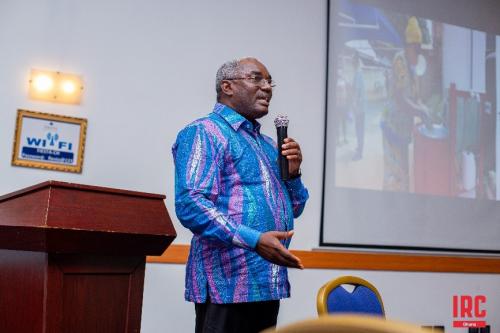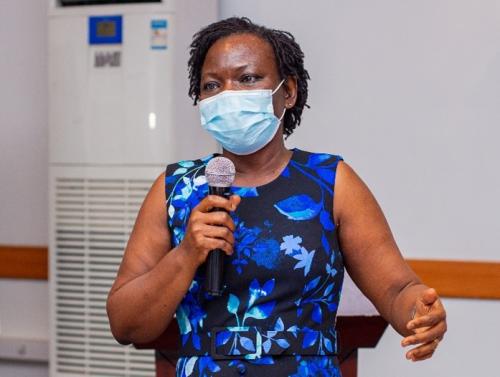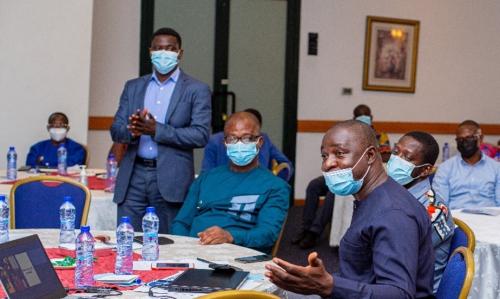At the fourth national learning event in Ghana, participants shared experiences on achieving Sustainable Development Goal 6 in their area
Published on: 31/01/2022

IRC Ghana in collaboration with the National Development Planning Commission (NDPC), WaterAid Ghana and Water4 hosted the fourth national learning exchange on strengthening local systems through district-wide initiative for safe and sustainable water, sanitation, and hygiene (WASH) service delivery for everyone.
The learning event took place in Accra on October 27, 2021, with over seventy (70) participants drawn from twelve (12) metropolitan, municipal and district assemblies (MMDAs), ministries, departments and agencies (MDAs), as well as development partners, local and international civil society organisations, research institutions, private sector, and the media.

In his keynote address, Dr. Kodjo Mensah-Abrampa, Director General of the NDPC lauded the Asutifi North and Wassa East District Assemblies for the progress made towards achieving safe and sustainable WASH services for their people. He however admitted, “Ghana’s sanitation situation is not encouraging, and citizens need to change their attitudes and support Local Government Authorities to improve sanitation in their various jurisdictions.” Dr. Mensah-Abrampa commended IRC and partners for the great collaboration and called for more of such stakeholder engagements, adding, “such engagements make development plans more relevant and address the aspirations of the people.”

Vida Duti, IRC Ghana Country Director who set the scene for the day’s session stated, “We’re here today for the fourth national learning exchange, which is a platform for gathering together various stakeholders, including partners that are collaborating with local governments to achieve safe and sustainable WASH coverage. These learning exchange sessions are aimed at demonstrating that it is possible to fulfil the SDG 6 target of providing universal water and sanitation services in a district through collective efforts. We are demonstrating it at the district level with the hope that if we can put all of the good practices together and replicate, we'll be able to make progress at the national level.”
NDPC led the discussion together with the Wassa East and Asutifi North District Assemblies, and their respective partners – Water4/ Forward Development and IRC/ANAM partners. The mix of presentations and follow-up roundtable discussions brought to the fore the strong efforts and achievements the local assemblies have made working with partners to implement the district-wide initiatives to improve access to WASH services.

The Asutifi North District Coordinating Director, Mr. Samuel Badu-Baiden stated that the district has mainstreamed WASH into all their programmes and will continue to leverage partners’ financial and technical resources and expertise. In a presentation the Asutifi North District Planning Officer, James Atta-Era outlined the outcome of the initiative so far and noted that despite the remarkable achievements in water coverage, the district lags in sanitation and must dig-deep to find answers to the nagging inadequate sanitation issues. Promising innovations from the ANAM initiative noted by the Assembly include:
The District Coordinating Director of Wassa East, Mr. Ahmed Haruna Boffour indicated that they activated all the district structures in support of project implementation and are happy the success is immense with 93% access for safe water. In his presentation, the Wassa East District Planning Officer stated, “current investments resulted in the establishment of 662 professionally managed water points across the district resulting in 93% water access in 2021; 141 service delivery contracts with communities have been developed and the district is hopeful to achieve the remaining 7% by end of year, 2021. We are hopeful that the collaboration with partners will help resolve challenges such as concentration of iron in water sources, dispersed nature of settlements making water connections expensive, inadequate mobile money vendors and weak record keeping by vendors.”

Key learning points for strengthening local systems to deliver safe and sustainable WASH services were generated from the deliberations. The main discussion points noted for reflection centred on how to improve sanitation to the level of achievements in water, how to harness partnerships beyond what has been achieved to scale up the model, and how to help NDPC to get reliable data to report on the SDG 6 indicators.
On the question of how to move sanitation to the level of achievements in water, participants held that government and partners should:
On harnessing partnerships to scale-up the model, participants proposed that local governments should:
Finally, on ways to help NDPC obtain reliable data for enhanced reporting, participants held that:

Some notable take-away messages from the discussions included:
The overall impression across the range of participants at the end of the learning event was high and generally positive. Some participants shared their impressions:
The national learning exchange is an annual event that provides a platform for like-minded partners implementing district-wide approaches to achieving WASH and WASH-related SDGs to share their experiences; and learn at first-hand how these approaches are being rolled out towards strengthening strong local systems to deliver safe and sustainable WASH services for everyone.